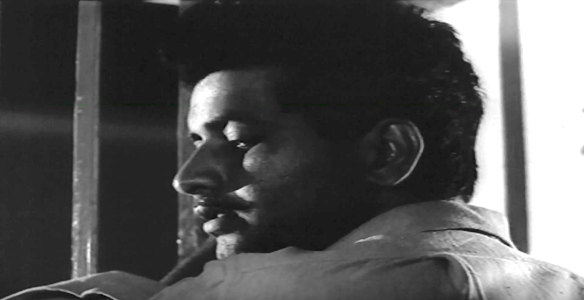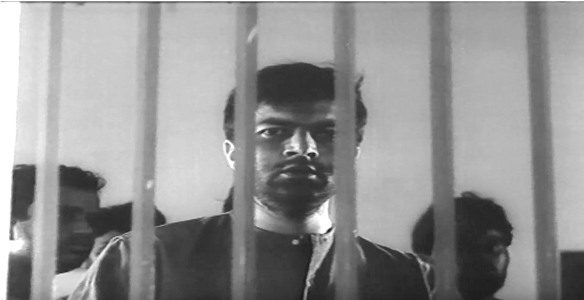
Manoj Kumar shines as the revolutionist Bhagat Singh who was executed by the British in Shaheed (1965).
In honor of India’s 70th Independence Day celebrations, today we present the lyrics and English translation of “Sarfaroshi Ki Tamanna.” An Urdu ghazal written in 1921 by Bismal Azimabadi, “Sarfaroshi Ki Tamanna” became a battle cry of freedom fighters through the 1940s. The poem was adapted for the film Shaheed (1965) starring Manoj Kumar about the life of freedom fighter Bhagat Singh. Known popularly as Mr. Bharat, Manoj Kumar would go on to make a name for himself glorifying the traditional Indian way of life in other patriotic films like Upkar (1967) and Purab Aur Paschim (1970). In Shaheed, Manoj Kumar settles comfortably into his niche, earning the Best Feature Film award.
Revolutionist Ram Prasad Bismil is sometimes incorrectly attributed with having written the ghazal himself, made more confusing by being a writer himself and sharing part of his name with the real poet. Nonetheless, Bismil, along with many other freedom fighters, helped spread the poem’s popularity.

Prem Chopra breaks from his typecast as the urbane villain to portray freedom fighter Sukhdev Thapur in Shaheed (1965).
In Shaheed, “Sarfaroshi Ki Tamannaa” is sung by Mohammed Rafi, Manna Dey, Rajendra Mehta who lend their voices to the characters of freedom fighters Bhagat Singh, Sukhdev Thapur, and Shivaram Rajguru, who were hung for their roles in the Lahore Conspiracy case in 1929. Rich in Urdu ornamentation, “Sarfaroshi Ki Tamannaa” highlights the fighters willingness to die for their country while awaiting execution. The poem describes the gentle, courageous nature of the revolutionists who are proud to rise to the occasion demanded of them by history.
We hope you enjoy the lyrics and English translation of the elegiac ghazal “Sarfaroshi Ki Tamanna” below. Follow along here with the music video from the film, and for the Urdu-inclined, the complete original poem can be found here!
Sarfaroshi Ki Tamanna Lyrics and Translation:
Ek se kartaa nahii.N kyuu.N duusraa kuchh baat-chiit?
Why does no one make conversation with others?
Dekhtaa huu.N mai.N jise woh chhup terii mehfil mei.N hai
Whomever I see is silent in your company
Woh chhup terii mehfil mei.N hai…
They are silent in your company
Sarfaroshii kii tamannaa ab hamaare dil mei.N hai
The desire to sacrifice is now in my heart
Dekhnaa hai zor kitnaa baazu-e-qaatl mei.N hai
I shall see how much strength is in the arms of my assassin
Waqt aane par bataa de.Nge tujhe, O aasmaan
I will tell you when the time comes, O sky
Hum abhii se kyaa bataaye.N kyaa hamaare dil mei.N hai?
What can I tell you now of what is in my heart?
Kyaa humaare dil mei.N hai…
What is in my heart…
Sarfaroshii kii tamannaa ab hamaare dil mei.N hai
The desire to sacrifice is now in my heart
Khai.Nch kar laayii hai sab ko qatl hone kii ummiid
Everyone has been pulled here by the hope of becoming killed
Aashiqo.N kaa aaj jamghaT kuuchaa-e qaatl mei.N hai
A congregation of lovers is in the street of their murderers today
Kuuchaa-e qaatl mei.N hai
They are in the street of their murderers
Sarfaroshii kii tamannaa ab hamaare dil mei.N hai
The desire to sacrifice is now in my heart
Glossary:
baat-chiit karnaa: to make conversation, chit-chat; chhup: silent; mehfil: company, gathering; sarfaroshii: sacrifice [literally: cutting of the head]; tamannaa: desire; dil: heart; zor: strength; baazuu: arms; qaatl: murderer, assassin; waqt: time; aasmaan: sky; khai.Nchnaa: to pull; ummiid: hope; aashiq: lover; aaj: today; jamghat: congregation; kuuchaa: street
It would be remiss to discuss this beautiful Urdu poem and its meaning for Indian independence without an inclusion of its equally profound legacy in Pakistan. Let us never forget that the movements that would eventually separate Pakistan and India during the partition were once far weaker than the hopes that united Hindu and Muslim freedom fighters in brotherhood against the British Raj. The dark shadow of partition that marred the celebration of Independence for thousands in the summer of 1947 is a subject close to my heart that I discuss more here along with the tragic decline of Urdu in Bollywood films.

The real Bhagat Singh who lived from 1907 until his execution in 1931 (left), Manoj Kumar in the film Shaheed from 1965 (middle), and Shammi Kapoor (right) in the film Shaheed Bhagat Singh from 1963.
“Sarfaroshi Ki Tamanna” was also adapted for the more recent film The Legend of Bhagat Singh starring Ajay Devgan (2002). A charismatic young man whose terroristic methods clashed with the non-violence advocated by Mahatma Gandhi, Bhagat Singh has been the subject of numerous Bollywood films, including a portrayal by Shammi Kapoor in Shaheed Bhagat Singh (1963) and Sunny Deol in 23 March 1931: Shaheed (2002).
In Gandhi’s own words upon Bhagat Singh and his associates’ executions: “These heroes had conquered the fear of death. Let us bow to them a thousand times for their heroism. But we should not imitate their act. In our land of millions of destitute and crippled people, if we take to the practice of seeking justice through murder, there will be a terrifying situation. Our poor people will become victims of our atrocities. By making a dharma of violence, we shall be reaping the fruit of our own actions. Hence, though we praise the courage of these brave men, we should never countenance their activities. Our dharma is to swallow our anger, abide by the discipline of non-violence and carry out our duty.”
As we celebrate our freedoms today, we reflect on these moral dilemmas faced by the oppressed whose sacrifices spared us from knowing them.
-Mrs. 55
